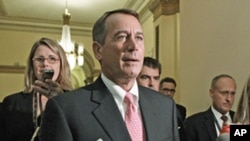The U.S. House of Representatives late Monday passed a bill to raise the country's debt ceiling in exchange for cuts in government spending - one day ahead of a potential default on America's $14.3 trillion national debt. The action now shifts to the Senate.
The spotlight was on the House of Representatives as the speaker, Republican John Boehner, read the vote tally on the final vote to raise the debt ceiling and avert default.
"'Ayes' are 269, the 'nays' are 161," said Boehner. "The bill is passed, and without objection a motion to reconsider is laid on the table."
House Democrats had a surprise to make the vote even more momentous, as House Minority Leader Nancy Pelosi explained:
“To witness the return of our colleague who is the personification of courage, of sincerity, of admiration throughout the country, Congresswoman Gabby Giffords," said Pelosi.
Representative Gabrielle Giffords of Arizona was shot and critically wounded in January during an assassination attempt and has been recovering ever since. It was the first time in the House chamber since the shooting. Giffords waved and thanked her congressional colleagues, who gave her a standing ovation. In a statement, she said she wanted to return to Congress to vote for the debt ceiling legislation.
|
U.S. Debt Deal Facts
|
After weeks of negotiations between Democratic President Barack Obama and Republican congressional leaders to forge a deal to raise the nation's borrowing limit, attention shifted Monday to House Democrats, who were unhappy with the agreement crafted late Sunday. A turning point might have come when House Minority Leader, Democrat Nancy Pelosi and Minority Whip Steny Hoyer came out in support of the bill on the House floor.
Representative Hoyer:
“I am voting for this bill - not because I like this bill, although it does do some things that I think need to be done," said Hoyer. "We need to bring down the [budget] deficit; we need to address the [national] debt; we need to return to fiscal responsibility. But default for the United States of America is not an option.”
The bipartisan bill would raise the U.S. debt ceiling by more than $2 trillion, enough to assure the federal government’s financial solvency through next year’s national elections - something the president insisted on. It also provides for two rounds of spending cuts.
Several liberal Democrats said they could not support the bill because they feel it is unbalanced - cutting social programs for the America's least fortunate and not asking anything of the nation’s wealthiest taxpayers. They said President Obama had compromised too much to win the support of conservative and libertarian Tea Party Republicans.
On the other side of the aisle, several Republican members of the House Armed Services Committee expressed concern about potential cuts in defense spending. Before the vote, Republican Representative David Dreier appealed for lawmakers from both major parties to vote for the legislation.
“Mr. Speaker, we are all in this together - Democrat and Republican alike," said Dreier. "We all stand to suffer tremendously, if we fail to either raise the debt ceiling or take this opportunity to fundamentally change course.”
The debt ceiling compromise faces its final hurdle with a Tuesday vote planned in the Senate, where analysts say it will likely pass and to go to President Obama for his signature.




